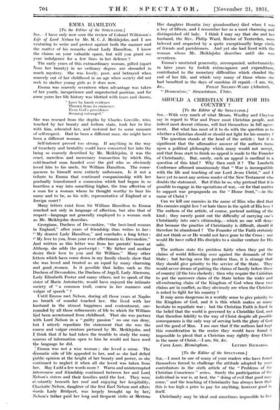EMMA HAMILTON [To the Editor of the SPEcTATmel SIR,—I have
only now seen the review of Colonel Wilkinson's Life of Lord Nelson by Mr. M. C. J. Meiklejohn, and I am venturing to write and protest against both the manner and the matter of his remarks about Lady -Hamilton. I know the claims on your valuable space, but will you grant me
your indulgence for a few lines in her defence ? .
The early years of this extraordinary woman, gifted (apart from her beauty) in no ordinary degree, are shrouded in much mystery. She was lovely, poor, and betrayed when scarcely out of her childhood in an age when society did not seek to shelter young girls as it does now.
Emma was scarcely seventeen when advantage was taken of her youth, inexperience and unprotected position. and for some years her life history was blotted with tears and shame, " Love by harsh evidence Thrown from its eminence Even God's providence Seeming estranged."
She was rescued from the depths by Charles Greville, who, touched by her beauty and forlorn state, took her to live with him, educated her, and restored her to some measure of self-respect. Had he been a different man, she might have been a different woman.
Self-interest proved too strong. If anything in the way of treachery and brutality could have converted her into the being so coarsely described by Mr. Meiklejohn, it was the cruel, merciless and mercenary transaction by which this cold-hearted man handed over the girl who so obviously loved him to his uncle, Sir William Hamilton. The conse- quences to himself were entirely unforeseen. Is it not a tribute to Emma that continued companionship with her gradually transformed a connexion which had begun in so heartless a way into something higher, the true affection of a man for a woman whom he thought worthy to bear his name and to be, as his wife, representative of England at a foreign court?
Many letters exist from Sir William Hamilton to Emma couched not only in language of affection, but also that of respect—language not generally employed to a woman such as Mr. Meiklejohn describes.
Georgians, Duchess of Devonshire, "the best-bred woman in England," after years of friendship thus writes to her :
"My dearest Lady Hamilton," and concludes a long letter : 0 My love to you, from your ever affectionate G. Devonshire."
And written as this letter was from her parents' house at Althorp, she adds the postscript : " My father and mother desire their love to you and Sir William." Many other
letters which have come down in my family clearly show that she was _loved and treated as an equal by many charming and good ',women. Is it possible that ladies such as the Duchess of Devonshire, the Duchess of Argyll, Lady Abercorn,
Lady Elizabeth Foster and many others, not to speak. of the sister of Marie Antoinette, would have enjoyed the intimate society of " a common trill!, coarse in her manners and vulgar of speech " ?
Until Emma met Nelson, during all those years at Naples no breath of scandal touched her. She lived with her
husband in the utmost -happiness and contentment, sur- rounded by all those refinements of life to which Sir William d been .accustomed from childhood. That she was partner with Lord Nelson in a " guilty passion no one can deny, but I utterly repudiate the statement that she was the coarse and vulgar creature pictured by Mr. Meiklejohn, and I think that if he had taken the trouble to study the many sources of information open to him he would not have used, the language he did.
Emma was not a wise woman ; she loved a scene. The
dramatic side of life appealed to her, and as she had defied public opinion at the height of her beauty and power, so she.
continued to neglect it when all she loved was taken from
her. May .I add a few words more ? Warm and uninterrupted intercourse and friendship continued between her and Lord Nelson's sisters and their families until the last. They were
cuistantly beneath her roof and enjoying her hospitality,. Charlotte Nelson, daughter of the first Earl Nelson and after; wards Lady Bridport, was largely brought up by herZ Nelson's father -paid her lone and frequent visits' at -Mertono
Her daughter Horatia '(4 grandmother) died when I was a' boy of fifteen, and I remember her as a most charming and distinguished old lady. I think I may 'say that she and her husband, the Rev. Philip Ward, Rector of Tenterden, were beloved and respected by a quite exceptionally large circle of friends and parishioners. And yet she had -lived with the woman whom Mr. Meiklejohn describes until 'she was seventeen.
Errima's unstinted generosity, accompanied, unfortunately, in later years by foolish extravagance and expenditure, Contributed to the monetary difficulties which clouded the end of her life, and Which very many of those whom she had benefited in the days of sunshine ill repaid.I am, Sir,
































































 Previous page
Previous page